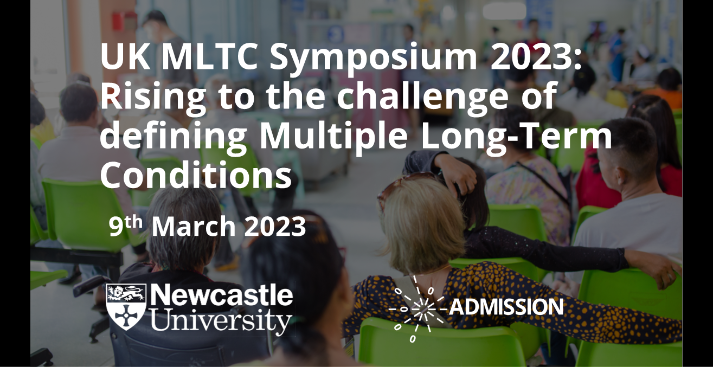News & Events
UK MLTC Symposium 2024: Building capacity in the UK MLTC community
.png)
UK MLTC Symposium 2024: Building capacity in the UK MLTC community will be held virtually on 18th April 2024 1400-1700
We hope you will join us for this event hosted by members of the ADMISSION Research Collaborative based at Newcastle University. It will be a great opportunity to hear about the complementary ways in which leading UK researchers are building capacity for future research, teaching and treatment of Multiple Long-Term Conditions (MLTC) in different contexts.
This free virtual event is designed for the research and healthcare community and welcomes delegates from all disciplines, including those who do not currently work in the area of MLTC but are keen to learn more.
Please click here to join our mailing list: Join the mailing lists - ADMISSION (office.com) and follow us on X @AdmissionCollab
See below for the provisional programme and Register here
|
Time |
Session* |
Speaker |
|
14:00 – 14:05 |
Welcome & introduction |
Professor Avan Aihie Sayer, William Leech Professor of Geriatric Medicine, Newcastle University & Director, NIHR Newcastle BRC |
|
· Building capacity in MLTC research |
||
|
14:05 – 14:30
|
Introducing the new Multiple Long-Term Conditions (MLTC) Cross-NIHR Collaboration (CNC)
|
Professor Avan Aihie Sayer & Professor Kamlesh Khunti, Professor of Primary Care Diabetes and Vascular Medicine, University of Leicester & Director, NIHR ARC EM |
|
14:30 – 14:50 |
The NIHR Academy approach |
NIHR Academy member – to be confirmed |
|
·Building capacity in data science for MLTC research |
||
|
14:50 – 15:10
|
The Health Data Research UK (HDRUK) approach |
Professor Elizabeth Sapey, Professor of Acute and Respiratory Medicine, University of Birmingham, Director of PIONEER, the Health Data Hub in acute care |
|
15:10- 15:30 |
The AI for MLTC Research Support Facility (AIM RSF) approach |
Dr Kirstie Whitaker, Programme Director for Tools, Practices and Systems, The Alan Turing Institute |
|
15:30 – 15:45 |
BREAK |
|
|
·Building capacity in care for MLTC |
||
|
15:45 – 16:05 |
MLTC care and the future of undergraduate medical education |
Professor Gill Vance, Professor of Medical Education, Newcastle University |
|
16:05 – 16:25 |
MLTC care and the future of postgraduate medical training |
Dr Richard Bellamy, Deputy Dean and Director of Specialty Training, North East & North Cumbria |
|
· Supporting the next generation of MLTC researchers |
||
|
16:25 – 16:55 |
Novel approaches to research capacity development for MLTC research: key learning from ADMISSION and the MLTC Communities of Practice |
Professor Rachel Cooper, Professor of Translational Epidemiology, Newcastle University Community of Practice Leads: Dr Sue Bellass, Manchester Metropolitan University Dr Stephanie Hanley, University of Birmingham Dr Jane Masoli, University of Exeter Dr Luke Pilling, University of Exeter |
|
16:55 – 17:00 |
Closing comments |
Professor Miles Witham, Professor of Trials for Older People, Newcastle University |
*All sessions will include 5 minutes for questions with the final session allowing for 10 minutes Q & A
UK MLTC Symposium 2023: Rising to the challenge of defining Multiple Long Term Conditions

UK MLTC Symposium 2023: Rising to the challenge of defining Multiple Long-Term Conditions
Members of the ADMISSION Research Collaborative in the AGE Research Group were delighted to host the UK MLTC Symposium 2023 online on 9th March, welcoming over 170 academics and patient and public representatives from across the UK and beyond.
The focus of this event was showcasing how researchers are rising to the challenge of defining multiple long-term conditions in different contexts. The event also highlighted the importance of transparency and consistency in approach to help drive forward research in this important area.
Delegates were delighted to hear Professor Bruce Guthrie, Professor of General Practice at the University of Edinburgh give an inspiring keynote talk on a state of the art approach to defining multiple long-term conditions. Following on from this, delegates heard from two members of the ADMISSION Research Collaborative, Professor Rachel Cooper and Professor Miles Witham and Professor Krish Nirantharakumar, Principal Investigator of MuM-PreDiCT.
"Very informative symposium that highlighted many of the challenges in MLTC research that we need to overcome" - MLTC Symposium Delegate.
There was also an opportunity to hear from two next generation researchers, Dr Sue Bellass from Manchester Metropolitan University and Dr Lucy Stirland currently based at the Global Brain Health Institute, University of California who described their routes into multiple long-term conditions research and offered excellent advice to other researchers in the early stages of their careers.
Smaller breakout groups provided the opportunity for some delegates to meet the speakers and share their views on important questions relevant to the field. A final panel discussion which considered next steps and highlighted the value of collaborative working was chaired by Professor Elizabeth Sapey from the University of Birmingham.
" I found the symposium really informative, hearing from the other projects is always very interesting. Finding out how the teams are approaching the projects in different ways but still with the focus on addressing inequalities and the challenges of living with MLTC’s makes me feel positive for the future and hopeful for some insights and eventual improvements to treatments and care pathways. Being able to hear from and speak to Bruce Guthrie was a fantastic opportunity. We discussed the challenges to MLTC research and possible ways to keep progressing in this area, again giving hope for future patient benefits " - MLTC Symposium Delegate.
We thank all of our speakers and delegates for their excellent contributions reflecting what an engaged community of people there is focused on the important goal of improving the lives of people living with multiple long-term conditions.
Sign up to our mailing list or follow us on Twitter to join the conversation
